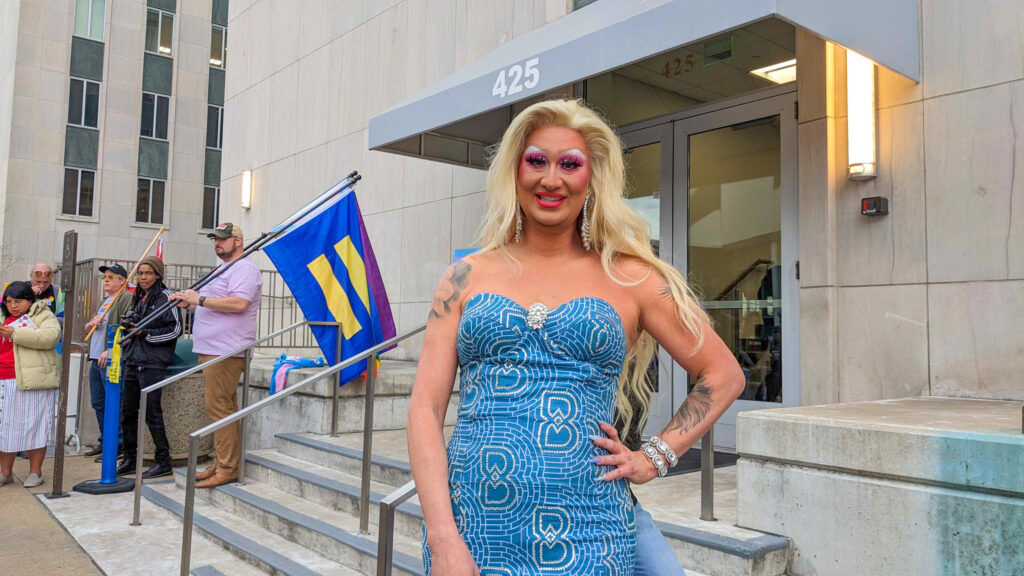
It’s the morning before two anti-LGBTQ bills will be debated publicly for the first time, and the ACLU’s Tennessee office is filled with people preparing to testify. They’re crammed into different corners of the office, flipping through print-offs and taking a highlighter to where state lawmakers have put last-minute amendments. Some are rehearsing their points with a partner or just commiserating about the day ahead.
“It’s a lot to try to cram into three minutes,” says David Taylor, who runs one of Nashville’s oldest and best-known queer bars.
His club, Play, has served as a launchpad for drag queens. Several of his performers, like Aura Mayari, have made it onto shows like RuPaul’s Drag Race.
But legislation making its way through the Tennessee statehouse would ban drag performers from public spaces.
The language of the bill has drawn concern from the larger LGBTQ community. The ACLU’s Henry Seaton says it could lead to criminalizing trans people — or anyone who doesn’t conform to a certain idea of gender.
“They don’t define male and female impersonators as just drag performers. That can easily be a trans person. There’s the phenomenon of walking while trans, where specifically women of color … often times get the police called on them just for being trans,” Seaton says.
For his testimony, Taylor is taking a different angle on how the bill would affect him as a businessman. Hours from now, he will argue that his drag shows are lively and joyous, and not adult cabaret:
“We know this because we have a Tennessee liquor license and are bound by Tennessee liquor laws. Our more than 20 years in business, we’ve not received a citation for one of our drag performers.”
 Marianna Bacallao WPLN News
Marianna Bacallao WPLN NewsA whiteboard in the ACLU of Tennessee’s office
As Taylor readies his statement, others in the office are prepping for a different hearing. Another bill being read today would ban gender-affirming care — things like hormone therapy — for the state’s trans teenagers.
Sinback shares some bad news for their case against that bill: The father who was going to testify on behalf of his trans daughter has backed out.
“(He) became too afraid to testify because they included language in the amendment that would make it child abuse to support your child’s gender-affirming care,” she says.
That amendment didn’t make it into the final proposal, but bills like these have trans people and the families of trans children worried for the future of Tennessee. That’s why when one concerned parent drops out, it’s easy for the ACLU to find another.
“The law that they’re trying to pass, it changes the conversation and tries to make it seem like you’re a bad parent for advocating for your child,” says Ana Cazalas. She drove to Nashville from Memphis with her kids, Ellie and Lucas.
Lucas was kicked out of school for wearing an “Everyone Welcome” sweatshirt from the Target Pride collection, and he’s still mad about it.
His older sibling, Ellie, has had a harder time at their private school as a nonbinary student. They say that, to get an education, they have to keep their head down. But Ellie is determined to speak up now.
“In other situations, I haven’t been able to stand up because, you know, it might get me into serious trouble,” Ellie says. “It feels nice to be able to (speak) … because I’ve been dealing with a lot of hate from other places and I couldn’t say anything.”
As Ellie is looking over their remarks, Kathy Sinback gets word from the statehouse that lawmakers aren’t going to let Ellie and their mom testify. Ellie’s mom tries to rally them, saying they could come back another day. But in the end, Ellie is never able to testify.
That day, state Republicans said trans kids are confused, and that this law would shield them from making a mistake.
Ellie shares that if they could be in that room, this is what they would say: “I am very much old enough to have control of my body. And I have my mom, who is very supportive and very knowledgeable, and adding a doctor to that team would only make this better.”
Laws passed in recent years have taken so much from trans kids like Ellie — the ability to use the school bathroom that aligns with their gender, to play on a school sports team or to read about themselves in the library. Now, they’re losing gender-affirming health care, and with the ban on drag shows, the ability to see themselves on stage, as happy adults.
Ellie says once they turn 18, they’ll likely leave Tennessee and not look back.

